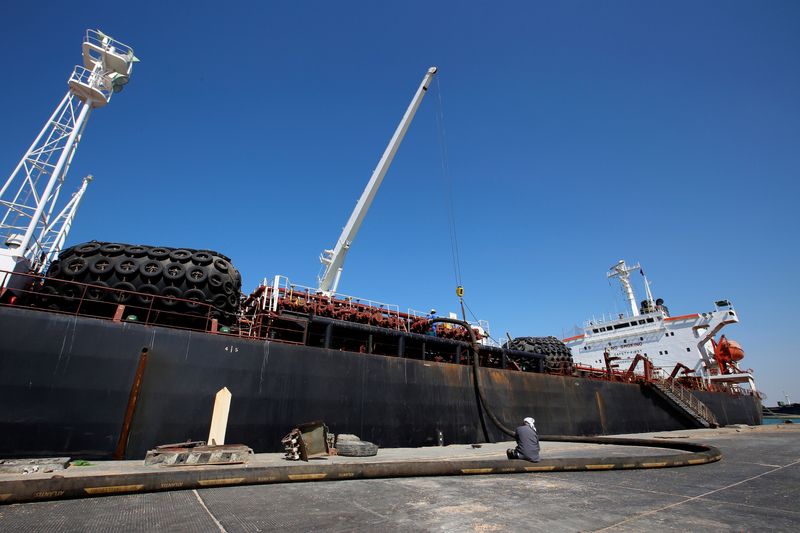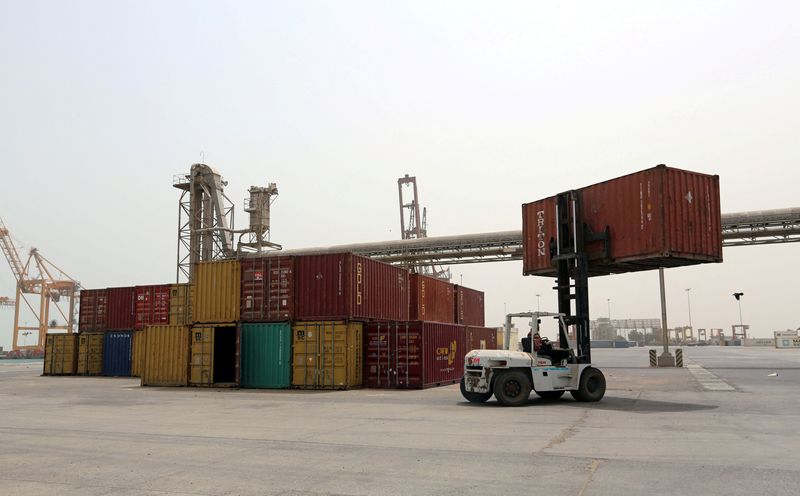By Marwa Rashad, Robert Harvey and Natalie Grover
LONDON (Reuters) - Several shipping companies and a few liquefied natural gas (LNG) tankers have decided to avoid the world's main East-West trade route, following attacks launched by Yemen's Houthi group on commercial ships at the southern end of the Red Sea.
The attacks raised the spectre of another bout of disruption to international commerce following the upheaval of the COVID pandemic, and prompted a U.S.-led international force to patrol waters near Yemen.
IS THE RED SEA ROUTE IMPORTANT FOR THE LNG MARKET?
The attacks have made reaching the Suez Canal more perilous.
About 12% of world shipping traffic transits the canal and 4-8% of global LNG cargoes have passed through it in 2023.
As much as 8.2 million barrels per day (bpd) of crude oil and oil products traversed the Red Sea over January-November, according to analytics firm Vortexa.
This year, a total of 16.2 million metric tons (MMt), or 51% of LNG trade, has flowed from the Atlantic Basin east through the Suez Canal, while 15.7 MMt went through the canal from the Pacific Basin west, according to S&P Global (NYSE:SPGI) Commodity Insights.
WHO ARE THE MAIN SHIPPERS THROUGH THE ROUTE?
The Suez Canal is one of the most important arteries of the global oil trade.
Northbound traffic - worth 3.9 million bpd this year - is dominated by European imports, primarily of crude oil from Middle East producers and also of middle distillates from India and the Middle East, said Vortexa's head of intelligence and analysis for MENA Jay Maroo.
Southbound traffic - at 2.9 million bpd in 2023 to date - comprises crude flows, mainly from Russia to Asian customers, and also refined products naphtha and fuel oil, he added.
Qatar, the United States and Russia are the most active shippers of LNG via Suez.
Qatar tops active shippers of cargoes heading from the East to Europe, but nonetheless provides only around 5% of net EU and UK imports.
"In reality, Qatar is the only exporter in an east-to-west direction via the Suez Canal,” said Robert Songer, LNG analyst at date intelligence firm ICIS.
An alternative route to Europe through the Cape of Good Hope could increase Qatari voyage days by 145%, or an extra 22 days on a round-trip basis.
For LNG to Asia, Qatar comes on top followed by the United States which has been using the Suez Canal recently as an alternative to the Panama Canal.
ARE PRICES IMPACTED?
Asian spot LNG prices are currently at $12.3 per million British thermal units (mmBtu) and have remained around this range since the start of the attacks.
High inventories in Europe and North Asia are capping demand and expected to curb spot price growth in H1-2024.
Oil prices meanwhile have rallied in recent days to around $79 a barrel on Tuesday, but remain below their fourth quarter average of around $83.30 a barrel.
Prices have fallen in recent weeks mounting demand concerns and growing indications that the world will go into 2024 in a supply surplus.
"The recent rise in oil prices is understandable, but the rally will not last, unless oil supply is materially affected," said Tamas Varga of oil broker PVM.
Oil freight prices are already impacted, however.
Rates for booking a Suezmax to transport crude from the Middle East to Europe have gone up 25% in a week according to Vortexa.
Insurance war risk premiums have gone up from $2,000 to $10,000 as a result of the disruption, a shipping source who declined to be named told Reuters.
HOW MARKET PLAYERS SEE THE RISK?
Crude and oil products market players said the extent of the impact will be determined by the duration of shipping disruptions as a result of the Houthi attacks.
It is unlikely that much will change unless situation goes on for longer than a couple of weeks, an analyst at a trading house said.
"We haven’t observed any panic buying or any behavioural change in refiners yet," he added.
The delays are most likely to impact medium sour crudes from Middle East producers, which could be substituted with grades of similar quality from Brazil, Guyana and Norway, a crude trader told Reuters.
LNG market players believe LNG trade is likely to be largely unaffected and any disruption would not have a massive impact on global supply.
The majority believe that U.S. shipments, if they head to China/Asia, could only see short-term delay if cargoes reroute.
"The physical risks to Suez LNG transit are more weighted towards keeping Atlantic supply pointed at Europe than

stopping Qatari supply from reaching Europe," said Jake Horslen, senior LNG analyst at Energy Aspects.
The chairman of the Japan Gas Association (JGA), Takahiro Honjo, told a news conference that while there are risks, "I don't think a supply crunch will suddenly occur anytime soon".
